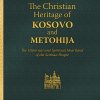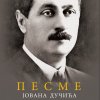Published by: Sebastian Press, Los Angeles. Co-publishers: Institute for Balkan Studies, Serbian Academy of Sciences and Arts, Belgrade • The Episcopal Council of the Serbian Orthodox Church in North and South America • Faculty of Orthodox Theology, University of Belgrade • BLAGO Fund • Serbica Americana • Interklima-grafika, Vrnjci
“This book on Serbia’s Christian Heritage in Kosovo and Metohija, its heartland in medieval times and through Ottoman domination, is intended to introduce to a wide reading public the oldest and richest treasury of Serbian medieval history and culture. Its authors are leading specialists in the fields in which they write, so readers may place complete reliance on the factual accuracy of the material.”
“The editor and publisher have the fervent hope that today’s peoples in Kosovo and Metohija will be able to begin their discussions not from what divides them but from what unites them, emphasizing in positive and constructive ways the areas in which a Serbo-Albanian ethnic symbiosis has existed. This book invites all to consider their differences in the light of history and of the future.”
Authors: Gojko Subotić • Alex Dragnich • Slavko Todorovich • Thomas A. Emmert • Sima M. Ćirković • Arthur Evans • G. K. Chesterton • Boško Bojović • Atanasije Jevtić • Alexander F. Hilferding • Rebecca West • Rebecca West • Stamatis Skliris • Dušan T. Bataković • Radovan Samardžić • Dimitrije Djordjević • Dimitrije Bogdanović • Sava Janjić • Andrew Wermuth • F. W. Harvey and others
This book is a vibrant testimony to the incredible efforts made by the Serbian Orthodox Church to create a spiritual culture, maintain its monuments, and preserve its inheritance in Kosovo and Metohija.
This 1,000-page book is hardbound and in full color, illustrated with over 750 color reproductions of all of our most significant historical figures, monasteries, churches, frescoes, icons, and other artifacts.
Book Reviews:
“The Christian Heritage of Kosovo and Metohija is a rare and extraordinary achievement” – Archbishop Demetrios of America (New York)
“It is indeed a magnificent production, of value equally because of the interesting text and of the fine illustrations. Congratulations are due to all who have collaborated to produce such an impressive volume.” - Metropolitan Kallistos Ware
“The lovely and learned volume, 'The Christian Heritage of Kosovo and Metohija' is a wonderful addition to the Dumbarton Oaks Research Library, where it will be used and appreciated by many scholars” - Deb Stewart, Dumbarton Oaks Research Library, Washington, DC
“The best book ever published in Serbia” - Prof. Dr. Dusan T. Batakovic (Belgrade)
“This book is the best proof that Kosovo is Serbian” - Metropolitan John of Pergamon (Zizioulas)
“This book deserves an award on Frankfurt Book Fair” - Manolis Velitzanidis (“Indiktos", Athens)
“This book is our passport to the world” - Zivojin Rakocevic (Pristina)
“This is a book that ‘buys you’ at first sight” - Minister Nikola Selakovic (Belgrade)
“By this capital work of great significance the Serbian people is presented to the world in the light of its spiritual and cultural creativity and statesmanship in Kosovo and Metohija” - Prof dr Radmila Milentijevic (New York)
Language: English
ISBN: 978–86–82685–39–5
Number of pages: 1008
Number of color reproductions: 794
Product Dimensions: 12.1 x 9.4 x 2.7 inches
Shipping Weight: 13.2 pounds
Online Purchasing:





